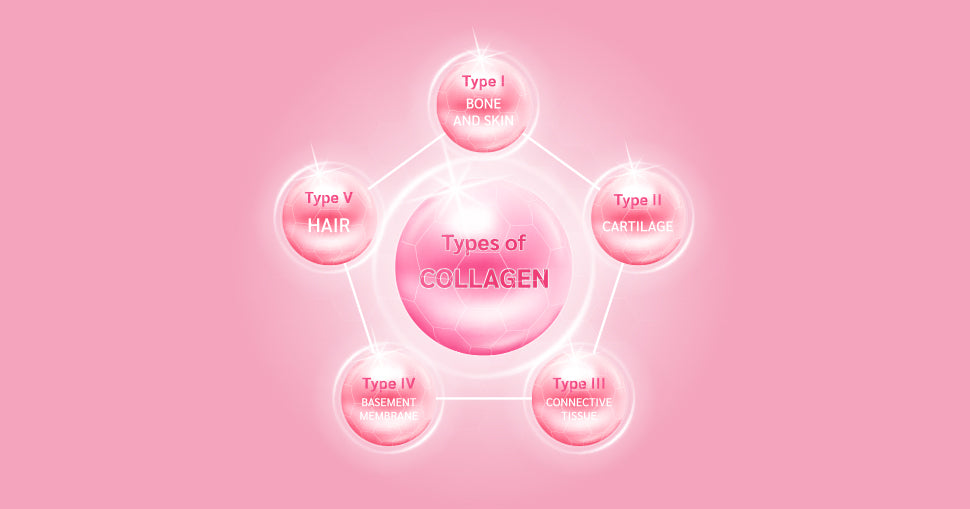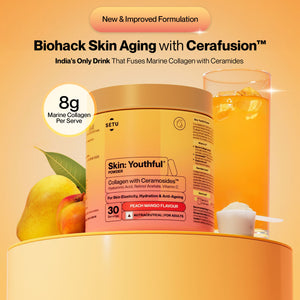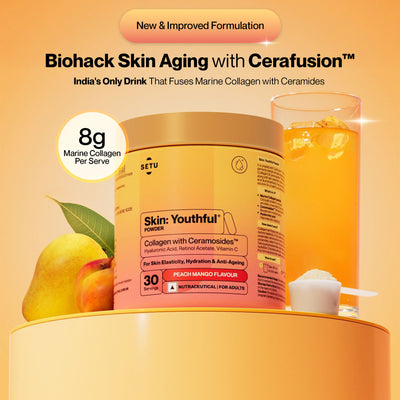Collagen Supplements Demystified: Types, Benefits, and Considerations
11 Mar 2024
Introduction to Collagen
Collagen is one of the most abundant proteins in the human body. It makes up a large part of connective tissues like skin, tendons, ligaments, cartilage, bones, blood vessels, and teeth. Collagen gives structure and strength to tissues while also providing elasticity and hydration.
As we age, our bodies produce less collagen which can lead to common signs of aging like wrinkles, sagging skin, and joint pain. Collagen levels start to decline around age 25. By boosting collagen, we can help counteract some age-related changes.
This is where collagen supplements come in. Collagen supplements provide concentrated doses of collagen that aim to compensate for our body's decreasing collagen production. They have become popular anti-aging and joint health supplements. But with so many collagen supplement options now available, it can get confusing to understand the different types of collagen and their potential benefits.
This article will demystify collagen supplements - the different types of collagen, evidence-based benefits, who should take collagen, and considerations when choosing a supplement. We'll also look at why collagen is so vital for healthy, youthful skin and joints. Let's start by understanding the different sources of collagen used in supplements.
Types of Collagen Supplements
- Type I: This is the most abundant collagen in the body accounting for 80-90% of our collagen. It provides structure by making up tendons, skin, ligaments, bones, teeth and organs. Supplements derived from bovine, porcine, marine animals or eggshell membranes are good sources of type I collagen.
- Type II: This collagen is primarily found in cartilage and helps build connective tissue. Supplements derived from chicken cartilage contain significant amounts of type II collagen. They support joint health and skin elasticity.
- Type III: Along with type I, this collagen forms connective tissues throughout the body. Supplements from bovine and marine sources provide type III collagen. They help build elasticity and firmness of the skin, arteries, and other tissues.
- Type V: Present alongside type I, this collagen is found in hair, placenta, and tissues containing type I collagen. Bovine-derived supplements offer type V collagen to promote tissue/cell health and elasticity.
- Type X: Present in small amounts in cartilage, this collagen helps with bone formation and remodeling. Supplements from marine sources like shark cartilage contain type X collagen. They support joint health and bone tissue growth.
Benefits of Collagen Supplements
Collagen supplements have become increasingly popular due to their numerous health benefits. Here are some of the top benefits of taking collagen supplements:
1. Improving Skin Health and Reducing Wrinkles
Collagen is a major component of the skin. It plays a role in strengthening skin, plus may benefit elasticity and hydration. As we age, collagen production in the skin declines. Taking a collagen supplement can help boost your body's natural collagen production, leading to firmer, smoother skin with fewer fine lines and wrinkles.
2. Relieving Joint Pain
Collagen provides structure to your bones and connective tissues. As we age, collagen in the joints can break down, leading to joint deterioration and pain. Studies suggest that collagen supplements can reduce inflammation and stimulate collagen synthesis in the joints. This may lead to reduced joint pain among people with osteoarthritis.
3. Supporting Bone Health
Some research shows that collagen supplements may help boost bone mineral density and lower the risk of bone fractures. This is because collagen helps form the basis for bone matrix and strength. Taking collagen supplements may stimulate collagen synthesis and prevent bone breakdown to support bone health.
4. Promoting Heart Health
Collagen provides structure to your arteries. Preliminary studies suggest that taking collagen supplements may reduce artery stiffness and plaque buildup in the arteries. This could lower blood pressure and promote heart health. More research is needed to confirm these heart benefits.
5. Boosting Muscle Mass
Emerging research suggests that collagen supplements may increase muscle mass. This may be due to its potential to stimulate muscle protein synthesis after exercise. More research is needed, but collagen may benefit aging adults who wish to promote muscle growth and strength.
6. Strengthening Hair and Nails
Collagen supplements may help strengthen hair and nails by providing the amino acids needed to build keratin. Keratin is a protein that makes up your hair and nails. Overall, collagen supplements may improve hair and nail growth, prevent breakage, and enhance thickness.
7. Considerations When Taking Collagen
When adding collagen supplements to your health routine, there are some important factors to consider:
Safety and Side Effects
- Collagen supplements are generally safe for most people. However, some may experience side effects like a bad taste in the mouth, feelings of fullness, heartburn, rashes, itching, and swollen lips. These are typically mild and often subside with continued use.
- Those with food allergies should check that collagen supplements do not contain problematic ingredients like fish, shellfish or eggs.
- Some experts believe collagen supplements may increase the risk of kidney stones in some people. Those with a history of kidney disease or kidney stones should consult a doctor before taking collagen.
Recommended Dosages
- Most collagen supplement labels recommend a dosage of 2.5–10 grams per day. Many experts recommend starting with 2-5 grams per day.
- Higher doses like 10 grams per day may provide more anti-aging and joint benefits, but can also increase the risk of side effects. It's best to follow dosage instructions on the product label.
- For maximum absorption, it's ideal to split dosages and take collagen throughout the day rather than in a single large dose.
How to Take Collagen Properly
- Collagen supplements can be taken alongside food, or on an empty stomach about 30 minutes before eating.
- Because collagen requires acid for proper breakdown and absorption, taking it with vitamin C-rich drinks like lemon water can improve its bioavailability.
- It's best to avoid taking collagen alongside coffee or tea, as the tannins may hinder its absorption.
- Mixing collagen into smoothies, oats, yogurt or soups can help boost intake. Many report improved skin, hair and nails when taking collagen consistently for 2-4 months.
What to Look for When Buying Collagen
- Opt for a reputable brand that clearly lists ingredients and dosages on the label, like Setu’s Skin: Youthfu,l to replenish and enhance your body's collagen levels.
- Look for hydrolyzed collagen peptides for optimal absorption and digestion.
- Marine collagen sourced from fish may be higher in bioavailable forms of collagen compared to bovine or porcine sources.
- Collagen from pasture-raised, grass-fed cows contains less contaminants compared to conventional bovine collagen.
- For joint health, a combo product with collagen + hyaluronic acid + chondroitin/glucosamine provides additional benefits.
Do We Need Collagen Supplements?
Collagen is the most abundant protein in the human body, making up around 30% of total protein. It plays a vital structural role, providing strength and elasticity to tissues including skin, bones, tendons, ligaments, and blood vessels.
As we age, our natural collagen production decreases, leading to visible signs of aging such as wrinkles, sagging skin, and joint stiffness. This decrease starts in our mid-20s and drops substantially over the following decades. Some estimates suggest we lose around 1-2% of our collagen each year past age 25. This gradually thins the skin, weakens joints, and makes us more injury-prone.
That’s why many people turn to collagen supplements like Setu’s Skin: Youthful. A good collagen supplement can help counteract declining levels, as collagen peptides provide amino acids that are absorbed and used directly for building new collagen. Given our natural decrease in collagen over time and depletion from lifestyle factors, supplements can be a beneficial way to support our collagen needs. They provide building blocks that may help maintain youthful, healthy tissues as we age.
Conclusion
Collagen supplementation has become increasingly popular due to its touted anti-aging and joint health benefits. As we've covered, collagen is the most abundant protein in the body and provides structure and elasticity to the skin, bones, joints, and other connective tissues. Supplementing with collagen aims to counteract the natural decline of collagen that occurs with aging.
The main types of collagen supplements are types I, II, and III, which are derived from animal sources like bone broth or fish. Research shows that consuming collagen peptides may improve skin hydration, elasticity, wrinkling, and dermal collagen density. For joint health, clinical studies demonstrate collagen's ability to reduce joint pain and improve mobility.
When considering a collagen supplement, opt for a reputable brand that provides hydrolyzed collagen peptides for optimal absorption. Look for types I and III collagen at the very minimum. Stay hydrated when taking collagen and be patient, as research shows benefits are dose-dependent and can take 6-12 weeks. Those with food sensitivities should verify the supplement is free of common allergens.
Overall, collagen supplementation appears to be generally safe for most people and may provide anti-aging and joint supporting effects. However, more research is still needed to standardize optimal dosing. Talk to your healthcare provider before taking any new supplements. Make sure to consume collagen as part of a balanced diet and healthy lifestyle for the best results.
Skin: Youthful with Marine Collagen & Ceramosides™
- ₹1,514
- ₹1,514
-
₹2,200 - ( 31% OFF)
Categories
- Choosing a selection results in a full page refresh.
- Press the space key then arrow keys to make a selection.
this is the sidecart
















